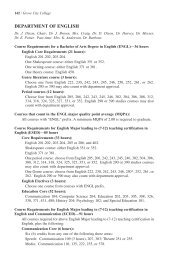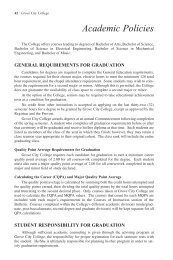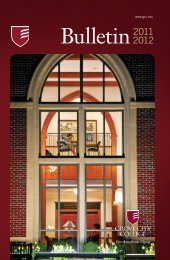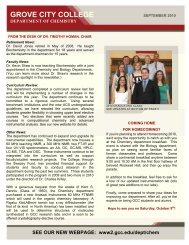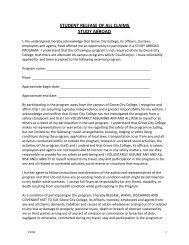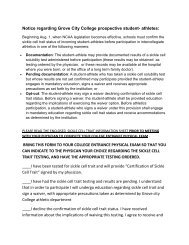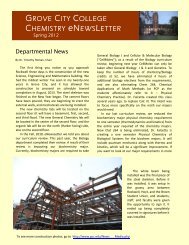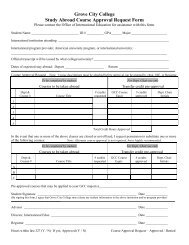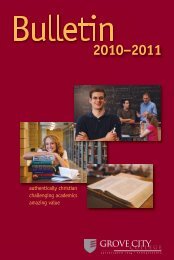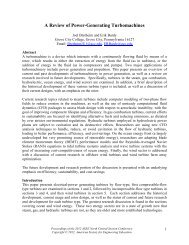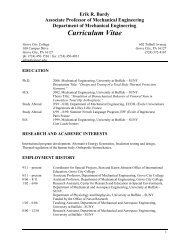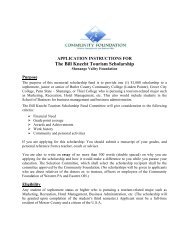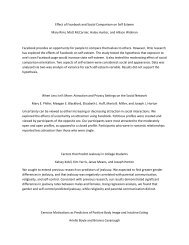2009–2010 - Grove City College
2009–2010 - Grove City College
2009–2010 - Grove City College
You also want an ePaper? Increase the reach of your titles
YUMPU automatically turns print PDFs into web optimized ePapers that Google loves.
148 / <strong>Grove</strong> <strong>City</strong> <strong>College</strong><br />
MATH 307. INVESTIGATIONS IN MATHEMATICS RESEARCH. An introduction to mathematics<br />
research. Teams of two to four students will investigate mathematical phenomena experimentally,<br />
detect patterns, create conjectures, and attempt to prove the conjectures and verify the patterns.<br />
Prerequisite: Mathematics 210 or 213. Spring semester only, one hour.<br />
MATH 325. NUMERICAL ANALYSIS I. An introductory course in numerical analysis that covers<br />
error analysis, computer arithmetic, algorithms, and convergence. Also covered are topics in numerical<br />
linear algebra such as direct and iterative methods for solutions of linear systems and numerical calculation<br />
of eigenvalues and eigenvectors. Prerequisites: Computer Science 141; Math 222.<br />
Alternate Fall semesters, three hours.<br />
MATH 326. NUMERICAL ANALYSIS II. A second course in numerical analysis that covers the<br />
solution of non-linear equations; interpolation and approximation; numerical differentiation and integration;<br />
and solutions of systems of non-linear equations. Prerequisite: Math 162.<br />
Alternate Fall semesters, three hours.<br />
MATH 331. THEORY OF STATISTICS I. An introduction to probability and mathematical statistics,<br />
including counting techniques; probability spaces; independence; conditional probability; distributions<br />
of discrete and continuous random variables; expected valued, moments and moment-generating<br />
functions; random vectors and their distributions. A computer algebra system is used. Corequisite:<br />
Math 261 or permission of instructor. Fall semester only, three hours.<br />
MATH 332. THEORY OF STATISTICS II. The continued study of mathematical statistics including<br />
transformations of random variables and vectors; sampling distributions; the Central Limit<br />
Theorem; properties of point estimates of parameters; maximum-likelihood estimates; confidence<br />
intervals; hypothesis testing; contingency tables; simple and linear regression; and one-way analysis of<br />
variance. Statistical software and a computer algebra system are used. Prerequisite: Math 331.<br />
Alternate Spring semesters, three hours.<br />
MATH 360. INDEPENDENT STUDY. An opportunity for junior and senior students, with a minimum<br />
of eighteen hours in mathematics, to do intensive independent study of specialized topics.<br />
Prerequisite: Junior standing. Semester course, one, two or three hours.<br />
MATH 365. COMPLEX VARIABLES. An introduction to the theory of functions of a complex<br />
variable including complex numbers; analytic functions; derivatives and integrals of functions of a<br />
complex variable; Taylor and Laurent series; and mappings by functions of a complex variable.<br />
Prerequisite: Math 261. Alternate Fall semesters, three hours.<br />
MATH 370. INDEPENDENT RESEARCH. An opportunity to conduct supervised research in<br />
Mathematics. Junior standing and permission of the department chair and a faculty sponsor are<br />
required. Semester course, one, two or three hours.<br />
MATH 388. TOPICS IN MATHEMATICS. A series of lectures/discussions on topics from such<br />
areas as: partial differential equations, numerical analysis, algebra, geometry, statistics, computer<br />
applications, analysis, or topology. Prerequisite: Permission of the instructor.<br />
Semester course, one, two or three hours.<br />
MATH 421. ABSTRACT ALGEBRA. A study of the structure of formal axiomatic systems and the<br />
elementary theory of groups and rings. Prerequisite: Math 210 or 213 and 222.<br />
Semester course, three hours.<br />
MATH 422. NUMBER THEORY. This course is, in part, an application of some of the ideas encountered<br />
in Math 421. Various results from the theory of finite groups, particularly results about the structure<br />
of finite cyclic groups, will be established and used to prove classical results of elementary number<br />
theory such as Euler’s Theorem and Wilson’s Theorem. The course will also cover modular arithmetic<br />
and congruences, arithmetic functions, the structure of Z n * , special numbers, and additional topics as<br />
time allows. Prerequisite: Math 421. Alternate Spring semesters, three hours.<br />
MATH 460. INDEPENDENT STUDY. An opportunity for junior and senior students, with a minimum<br />
of eighteen hours in mathematics, to do intensive independent study of specialized topics.<br />
Prerequisite: Junior standing. Semester course, one, two or three hours.



